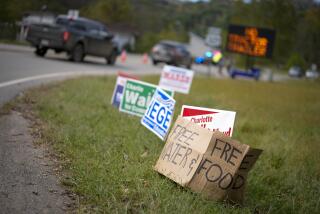House Votes for Standard U.S. Poll Closings
- Share via
WASHINGTON — The House on Wednesday approved legislation that would standardize poll closing times throughout most of the country during presidential elections to prevent election night television reporting from discouraging voting on the West Coast and skewing the results.
The measure, passed on a vote of 204 to 171, also would extend daylight saving time in the Pacific time zone for an extra one to two weeks during presidential election years.
Western states would shift back to standard time the Sunday after the November election, while the rest of the nation would switch on the last Sunday in October, as has been the practice.
Individual states and some municipalities now set their own poll closing times. However, the measure is intended to replace that hodgepodge during presidential elections with a uniform system that would halt voting in the Lower 48 states at exactly the same time.
Under the legislation, whose future is considered uncertain in the Republican-led Senate, the polls would close at 9 p.m. in the Eastern time zone, 8 p.m. in the Central zone and 7 p.m. in the Mountain zone. The Pacific zone, because it would be on daylight saving time, would also see polls close at 7 p.m.
Alaska and Hawaii would not be affected by the uniform closing time. States also could open polls when they wish.
The measure stems largely from the controversy over election night reporting that erupted in 1980, when many Western supporters of President Jimmy Carter are thought to have decided not to vote after television networks declared Ronald Reagan the winner on the basis of exit polls.
Backers of the changes argue that they are needed to counteract the potential impact of network television reporting on voting on the West Coast. Critics of the networks contend that the media have been influencing the outcome of national, state and local contests by projecting the presidential winner hours before polls close in the West.
“Over the last two decades, the integrity of elections has been gradually eroded,” complained Rep. Al Swift (D-Wash.), chairman of the House Administration subcommittee on elections. “Thousands of voters have been told, in effect, that the election has been held without them and their votes don’t count.”
But opponents argued that the measure would usurp the power of state and local governments to set their own election rules, as well as increase the price of running elections in the East and Midwest, where many polling places might have to remain open longer than they now do.
The Congressional Budget Office estimated that later poll opening times would cost state and local governments at least $2 million in the 1988 presidential election, if the bill becomes law.
“We are doing social tinkering with the most precious commodity of the American people to satisfy a few people on the West Coast,” complained Rep. Bill Frenzel (R-Minn.).
Outside the political arena, the legislation was most vocally opposed by the airline industry, which claimed that the daylight saving time provision would temporarily confuse cross-country flight scheduling.
In 1980, Carter, reacting mainly to poll results, went on nationwide television at 6:15 p.m. California time to concede the contest to Reagan--an hour and 45 minutes before the polls were scheduled to close on the West Coast.
Many politicians and voters complained that the early end of the presidential contest discouraged some last-minute voting and, as a consequence, influenced the outcome of many other races.
In Reagan’s 1984 landslide win, CBS declared him the winner by 5:02 p.m California time, and NBC and ABC followed suit by 5:30 p.m.
Timothy J. Russert, a vice president of NBC News, denied that there is any evidence that network projections influenced the outcome of elections. Nevertheless, Russert said all three major networks had pledged last year to delay reporting projections in any particular state until the polls had officially closed in that state.
Such a promise, coupled with a uniform nationwide closing time, could alleviate the potential for the networks affecting election results, officials said.
A nationwide opinion survey of public attitudes toward the media released earlier this month indicated overwhelming public support for the idea of taking action to prevent television reporting from influencing the outcome of elections.
The survey, conducted for the Times Mirror Co., parent company of The Times, asked about 3,000 people which they thought was more important--the networks’ ability to report their projections of winners instantly or the protection of citizens from becoming discouraged by such projections and perhaps not voting.
Of those surveyed, 72% said they believed it more important not to discourage voters, 18% sided with the networks and 10% said they could not respond.
More to Read
Get the L.A. Times Politics newsletter
Deeply reported insights into legislation, politics and policy from Sacramento, Washington and beyond. In your inbox twice per week.
You may occasionally receive promotional content from the Los Angeles Times.










